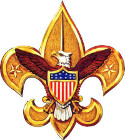
Overview Requirements Hints Terminology Resources
Chess Merit Badge Info
The mental skill development that comes from playing Chess directly supports the BSA mission, and the second point of the Scout Oath. Improvements in concentration, strategic planning, sportsmanship, and stress control are all benefits players can receive from chess. It's just a game, but a game played around the world for millennia.
For scouts that already play chess, this badge can be completed very quickly. It is composed of many Explain type requirements, demonstrating moves and scoring, and teaching very basic knowledge to another scout. The last requirement finally gets to the fun where a scout can actually play chess.
The merit badge pamphlet contains all the information for the knowledge requirements, all in one spot. Being such a simple set of requirements, and many youth already familiar with chess, this badge is at popularity spot #22 of all merit badges with about 25,000 scouts earning it each year. It is the only board game with its own merit badge!
Requirements for the Chess merit badge:
- Discuss with your merit badge counselor the history of the game of chess. Explain why it is considered a game of planning and strategy.
- Discuss with your merit badge counselor the following:
- The benefits of playing chess, including developing critical thinking skills, concentration skills, and decision-making skills, and how these skills can help you in other areas of your life
- Sportsmanship and chess etiquette
- Demonstrate to your counselor that you know each of the following. Then, using Scouting's Teaching EDGE*, teach someone (preferably another Scout) who does not know how to play chess:
- The name of each chess piece
- How to set up a chessboard
- How each chess piece moves, including castling and en passant captures
- Do the following:
- Demonstrate scorekeeping using the algebraic system of chess notation.
- Discuss the differences between the opening, the middle game, and the endgame.
- Explain four opening principles.
- Explain the four rules for castling.
- On a chessboard, demonstrate a "scholar's mate" and a "fool's mate."
- Demonstrate on a chessboard four ways a chess game can end in a draw.
- Do the following:
- Explain four of the following elements of chess strategy: exploiting weaknesses, force, king safety, pawn structure, space, tempo, time.
- Explain any five of these chess tactics: clearance sacrifice, decoy, discovered attack, double attack, fork, interposing, overloading, overprotecting, pin, remove the defender, skewer, zwischenzug.
- Set up a chessboard with the white king on e1, the white rooks on a1 and h1, and the black king on e5. With White to move first, demonstrate how to force checkmate on the black king.
- Set up and solve five direct-mate problems provided by your merit badge counselor.
- Do ONE of the following:
- Play at least three games of chess with other Scouts and/or your merit badge counselor. Replay the games from your score sheets and discuss with your counselor how you might have played each game differently.
- Play in a scholastic (youth) chess tournament and use your score sheets from that tournament to replay your games with your merit badge counselor. Discuss with your counselor how you might have played each game differently.
- Organize and run a chess tournament with at least four players, plus you. Have each competitor play at least two games.
(Optional worksheets are maintained by usscouts.org and they have sole control over their updates.)
Hints for Chess Merit Badge
- The person the scout teaches in requirement 3 can't already know chess, or else it's not teaching. The setup for requirement 5c is HERE and you can set up other problems to solve.
- Great badge to earn over winter since there's no outdoor activities.
- The scout doesn't need to win any games - just demonstrate how to play, not necessarily play very well.
Terminology for the Chess Merit Badge
- Castling - King and Rook pieces exchange places.
- En passant capture - a pawn can capture another pawn that just passed it on its opening 2-space move.
- Scholar's Mate - check mate in 4 moves (see it)
- Fool's Mate - check mate in 2 moves (see it)
Resources for Chess Merit Badge
Relive the History of Chess.
Learn about the Algebraic Notation in Chess.
Study the Phases of a Chess game, opening principles, castling rules, and ways to draw.
Here is a long list of Chess Tactic Definitions.
Download and print this Chess Scoresheet (PDF).
Some other merit badges in the Indoor Hobbies theme include: Coin Collecting, Collections, Model Design and Building, Reading, and Stamp Collecting. You might check them out if you found the Chess merit badge interesting.
Comments:
Sep 19, 2022 - Victor Babington
Apr 10, 2023 - Sam Olsen
Scouting 2026 - Ask a Question - Add Content
Just for Fun: Socializing merit badge




Find more Scouting Resources at www.BoyScoutTrail.com



Follow Me, Scouts
Recent Comments